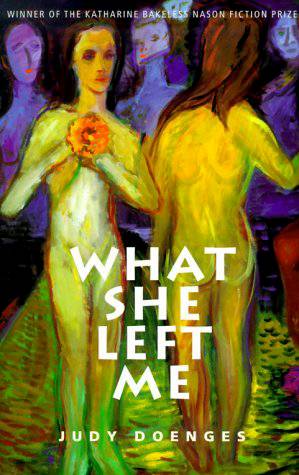What She Left Me
Judy Doenges

Amazon.com Review
The characters in Judy Doenges’s edgy What She Left Me are self-appointed outsiders: gamblers, petty criminals, men and women on the fringe of both gay and straight worlds. Chic, gin-soaked mothers haunt these stories, as do cops. There are guns, dubious inheritances, and a pervasive sense of emotional anomie. Caught in a police spotlight at the end of ‘Crooks,’ a teenager imagines that ‘this was the kind of light that would follow me to the police station, then to my home, even on to college, where I would be forever squinting and cringing under someone’s scrutiny, never quite measuring up, never quite fitting in.’ In ‘MIB,’ the narrator’s lover abandons her in search of someone who ‘lives here, outside, with the rest of us.’ Even the sense of family offered by the lesbian community is suspect. ‘As far as I was concerned’–according to the narrator of ‘Incognito’–‘gay people made up an amorphous, loose, happy group, pairing up for love but still remaining outlaws. This family business seemed too familiar and dangerous. An old idea like that made the present very confusing.’
Of course, it’s hard to write about alienation without leaving the reader disconnected as well. The two best stories in Doenges’s collection sidestep this problem by anchoring themselves firmly in the physical world. In the title piece, a waitress named Sandra obsessively catalogs the contents of her dead mother’s house: barware, swimsuits, two aging Great Danes, the father’s leather address book that he abandoned along with his family. Doenges switches gears in the masterful final novella, ‘God of Gods,’ in which a touchingly unworldly butcher named Odin Tollefson struggles with the changing social landscape of Chicago in the ’70s–and his own attraction to a male coworker. Odin is something Doenges’s other characters are not: engaged, palpably eager to love, to be loved, and to do the right thing. His story concludes with the sweetly redemptive sight of a bed sheet being folded back: ‘To Odin it was as if the earth had burst open beneath him and brought forth a newly minted, gleaming city.’ It’s the book’s only happy ending, and its most satisfying one, also. –Mary Park
From Publishers Weekly
Winner of Bread Loaf’s 1998 Bakeless Prize for Fiction, this collection of nine stories and a novella situates diverse characters in hard times, but supports them with an engaging tenderness and a succor of edgy humor. In ‘Crooks,’ Ceil is a bright teenage girl with thieving, pistol-toting bad-boy companions who lust after another girl, Jody. Ceil rebels not by merely defying her parents, but by mapping an odd, poignant course of self-destruction, sabotage and vulnerability amid her peers. She takes condoms out of Jody’s wallet and pokes them full of pinholes, and sweet-talks a grungy biker out of his knife, with which she cuts herself. A sense of menace builds throughout the story, underscoring the narrator’s sharp observations about her companions and herself. Other tales offer a young couple’s melancholy adventures in Las Vegas (‘The Money Stays, the People Go’) and an inexperienced woman making an awkward debut on Chicago’s lesbian dating scene (‘Incognito’). In ‘The Whole Numbers of Families,’ another lesbian character, whose relationship with her lover is foundering, clarifies her sense of family while visiting her dying aunt. The title story, while frank and polished, at times feels too studied, too neatly arranged; the heroine’s breakdown predictably parallels her mother’s disturbing legacy. The novella, ‘God of Gods,’ is a moving meditation featuring a six-foot-six butcher in a Chicago supermarket, Odin Tollefson, and his fraught coming-out as a gay man in the midst of the racial upheavals of the early 1970s. Elegantly contextualizing Odin’s sensitive, tentative coming to terms with his sexuality within a gritty, working-class urban setting, the narrative offers a respectful, finely tuned perspective on blue-collar gay life. This novella, like the strongest of Doenges’s other tales, sturdily depicts identity struggles in which the characters’ inner lives are given as much tough contemplation as their surroundings. (Aug.)
Copyright 1999 Reed Business Information, Inc.
Check for it on:
Details
| ISBN | 9780874519372 |
| Genre | Award Winner; Fiction; Short Story Collection (Single Author) |
| Publication Date | 01-Aug-99 |
| Publisher | UPNE |
| Format | Hardcover |
| No. of Pages | 192 |
| Award | Ferro-Grumley Award – 2000 (Lesbian Fiction); Bakeless Literary Publication Prize for Fiction – 1998 |
| Language | English |
| Rating | Great |
| Award | Ferro-Grumley Award – 2000 (Lesbian Fiction); Bakeless Literary Publication Prize for Fiction – 1998 |
| Subject | Fiction / General; Fiction / Short Stories; United States |
| BookID | 14419 |
